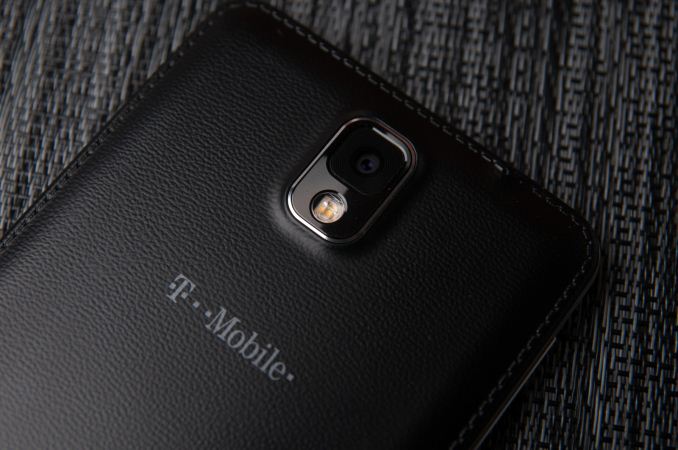Samsung Galaxy Note 3 Review
by Brian Klug on October 1, 2013 9:00 AM EST- Posted in
- Smartphones
- Samsung
- Mobile
- Android 4.3
- galaxy note 3
Camera
The cadence for camera on the Note platform has been pretty steady so far, it just inherits the camera module from the Galaxy S that came before it. In the case of the Note 3, that means the same module from Galaxy S 4, which is as far as I can tell what happened here. There’s an IMX135 sensor inside the Note 3, same as what shipped in GT-I9500, from Sony’s Exmor RS line. Specifically that means the Note 3 includes a 13 MP CMOS on the back with 1.12µm size pixels and a 1/3.06" optical format. Focal length changes slightly from 4.2 to 4.1 mm, but I’m not sure if this is just a rounding error, I suspect the same optical system is shared between the two, this works out to 31mm of focal length if you’re thinking 35mm equivalent numbers.
On the front is a 2 MP Samsung S5K6B2 CMOS with 1.34µm and 1/6" format. This is also shared with Galaxy S 4, which isn’t too surprising. So we have the same imaging on the back and the front as that flagship, with just different ISP in front of it with 8974.
Stills
For image quality we turn to the normal set of tests which I seem to always be adding to. Image quality bench locations taken at our usual set of locations, 3, 4, 5, 6, and 7 with the Note 3. In addition lights on and lights off in the lightbox, and the usual set of test targets.
Gallery: Smartphone Camera Bench
The Note 3 looks good outside and obviously reminds me exactly of the Galaxy S 4 when it comes to imaging performance. I never really had issues with SGS4 outside or in well lit scenarios, the Note 3 ends up being just about the same. I can’t say there’s really any surprises when it comes to still images out of the device, although the Note 3 absolutely struggles with white balance in the lightbox for some reason, which is odd considering Galaxy S 4 definitely didn’t have similar problems. Anyhow if you liked SGS4 imaging performance, Note 3 is definitely the same, it doesn’t really change the formula in low light however against the competition that now has OIS and bigger pixels, but I won’t belabor that point again.
Video
On the video side of the Note 3 we have an interesting new addition, 4k30 (or UHD) video record support, alongside both 1080p60 and 720p120. Higher framerate video has been an increasingly common thing lately, and the Note 3 supports this with the new video encode and decode capabilities of the 8974 SoC (Exynos 5420 doesn’t get any UHD video record features).
In the video recording UI you can select between the above video resolutions, at a framerate of 30 FPS. To get to 1080p60 you have to go under a different menu and select smooth motion, and 720p120 is under slow motion.
4k30 video gets recorded at 48 Mbps H.264 high profile with 1 reference frame, which will eat up space quickly but obviously blows things away with that much resolution, and 8974 doesn’t drop frames either. The 1080p60 video comes in at 28 Mbps H.264 high profile and also doesn’t seem to have any dropped frames. Audio in both cases is 128 kbps 48 kHz stereo AAC.
I uploaded two UHD samples to YouTube since it’s already 4K aware, if you select original quality from the switcher drop down. I don’t have a 4K display to view these on, but oversampled on the high resolution panels I do have it looks amazing. The 1080p60 content also looks great, although you’ll have to grab that one and view it on your own since YouTube (and really nowhere online I’m aware of) will show you 60p video at native framerate. I shot UHDp30 and 1080p30 videos in Times Square in NYC which you can grab, and UHDp30 and 1080p60 videos at the bench location which you can also grab if you want to look at that buttery smooth 60 FPS video.
I’m really impressed with video quality coming out of the Note 3, obviously having smartphones coming with UHD onboard is a big treat, and we now have smartphones beating other bigger standalone cameras to that punch.






















































302 Comments
View All Comments
Puddlejumper - Tuesday, October 1, 2013 - link
The disappointment here on this site isn't that Samsung is cheating, the problem is that AnandTech, which some of us considered the site with the most in depth and objective analysis, is aiding and abetting Samsung.Read the review. "More or less the fastest Android smartphone we have tested". "Isn't quite as fast as the iPhone 5s but in same cases it comes close". "Note 3 manages to get the edge over the powerVR G6430 in the iPhone 5s." And worst of all many screen of benchmark date that AnandTech knew was corrupted by Samsung but couldn't be bothered to even put an asterisk bedside the phones that they knew cheated on benchmarks. Instead, the explanation in the comments is that lots of phones are doing it so we will ignore it. Pity LG, Apple, and the rest of the manufactures who tried to play straight. AnandTech is telling them to bad, you should have cheated too.
It's clear why Samsung did it. I'm just extremely disappointed with AnandTech and their defense of their actions.
golemite - Tuesday, October 1, 2013 - link
It's a sad day when Anandtech condones cheating, and let's be honest- publishing poisoned benchmark results is exactly what that is.It used to be that I trusted Anandtech to deliver straight forward and honest reviews, but apparently everyone has their price.
fusoyaii - Tuesday, October 1, 2013 - link
Thanks to whoever mentioned the Ars review. I've never really gone to their site before, but after reading their REAL review of the Note 3, I think I'm switching to them as my main review site. I've been surfing AnandTech for years upon years and always looked forward to reviews here. I read entire articles for tech I'm interested in and knew about the "optimizations" that Samsung does, but it still makes a difference when you post charts/graphs showing unrealistic "tweaked" benchmarks.You guys should look at the Ars review of the Note 3 and learn from what they're doing. Including that video showing the real world lag of the software. Waiting for the Nexus 5 now...
Spunjji - Tuesday, October 8, 2013 - link
Why not read both and make your decisions that way..?tabascosauz - Wednesday, October 2, 2013 - link
The G2 came close to the iPhone 5S's results; it's nice to see the Note 3 take the prize for Qualcomm.I guess the 5S should really get some higher clocks.
ciparis - Wednesday, October 2, 2013 - link
Brian & Anand,I suppose it's obvious from the comments: people expect you to take a stand against cheating.
Unlike you guys, HardOCP was never known for their journalistic prowess. But I have to give them credit: when someone cooked the books, these guys would come unglued. Every aspect of the cheat would be laid bare for all to see, with the community in witness. The results speak for themselves: cheating on benchmarks by altering performance characteristics is not acceptable.
The industry will only do this as long as you let it. Sometimes you have to draw a line, and take a risk. There's no guaranteed outcome. But as a reader, I have come to expect that from you. It's a compliment (I hope).
ciparis - Wednesday, October 2, 2013 - link
One more note, in case it isn't obvious: these published benchmarks on Anandtech are taken as a statement of record.As such, it seems to me that the only thing people should be seeing here are results with no performance adjustments, or where you have defeated the measures -- since the entire point is to establish the relative performance people can expect in actual use.
Blairware - Wednesday, October 2, 2013 - link
I didn't have time to read 18 pages of comments, so I hope that I'm not being redundant in mentioning a mistake in the review. There are only 2 microphones for noise cancelation. the third small hole is for temperature / humidity sensor, just like the 3rd hole on the GS4. I was surprised to see this type of error on Anandtech of all places.jgrnt1 - Wednesday, October 2, 2013 - link
Though I rarely comment, I've been coming to AnandTech for years for objective, in-depth reviews. I have to say I was concerned when AMD "bought into" the site a few weeks ago. It seemed sort of like the big donor who backs a political candidate. The candidate will always claim that no influence was bought by the donation, but it will always be in the back of your mind. Integrity and trust suffer. The minimizing of Samsung's benchmark cheating is a sign that we need to question the integrity of the reviews presented here.Anand, I realize you need to monetize the site. It is your business. You have to pay the bills. However, people have come to your site over the years only partially because of the depth of your reviews and analysis. They have also come because they believed in your integrity. They trusted you. As others have said, by posting the benchmark results in your review without strongly calling out Samsung for cheating, you have rewarded the behavior. People who read the review, but who do not read the comments, will have a much more favorable opinion of the device and of Samsung's business practices than those who go to Ars and read their article. You have let down the people who trust you to be objective.
This morning, I read the Ars article. I was then on Gizmodo and, after reading their review of the Note 3, pointed to the Ars article in my comment. Then I came here, looking forward to seeing the review doing what I knew it would do. I expected an article with a lot more depth than the Ars review, but with the same tone. Cheating is unacceptable and must be called out loudly when it occurs. Instead, there was a brief mention and then the benchmarks were presented with the inflated numbers.
I think you should redo the review with corrected benchmark results and call out Samsung for cheating. Trust in your integrity built this site. Distrust will ruin it.
Squuiid - Wednesday, October 2, 2013 - link
+1